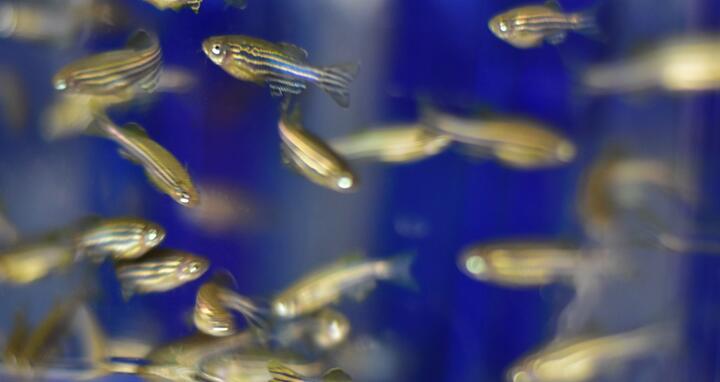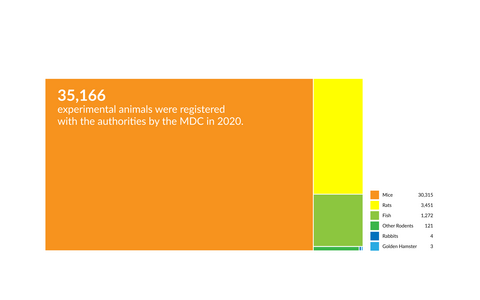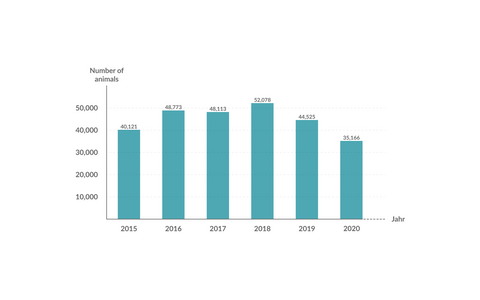MDC honored for exemplary communication on animal research
At the Max Delbrück Center for Molecular Medicine in the Helmholtz Association (MDC), a total of 35,166 animals were used for basic biomedical research in 2020. This represents 9,359 fewer animals than in 2019. The vast majority of animals used on the Buch campus and in Berlin-Mitte were mice (30,315 in total). In addition, MDC scientists used rats and fish to research how human diseases develop. The MDC has now submitted these figures to the regulatory authority, the Berlin State Office for Health and Social Affairs (LaGeSo).
Sharp decline due to coronavirus restrictions
The decline in the number of laboratory animals continues a trend of the past two years and can be attributed to several factors. The extent of the decrease in 2020 was mainly related to the coronavirus pandemic and more difficult research conditions in biomedicine. In March 2020, the MDC initially switched over to basic operations, and only a few research groups were able to continue working as usual. To date, all employees are in a state of extended basic operations, and physical distancing must still be maintained in the laboratories and offices. Operations in the animal facilities are also subject to stricter coronavirus regulations. As a result, fewer new experiments were begun during the pandemic.
In addition to the usual fluctuations (start or end of experiments or research groups), the 3R principles (replace, reduce, refine), which scientists at MDC systematically follow and continue to develop, were also a contributing factor. In late 2020, the MDC opened its new Preclinical Research Center (PRC). Here, the MDC has created the best conditions for necessary animal testing in medical research, making sure animals suffer as little as possible and reducing the number of animals used to a minimum.
In most cases, MDC researchers conduct studies on cell or tissue cultures and often use computer models and artificial intelligence in their research. They are also creating new methods to analyze medical problems, for example, with organoids (mini-organs in a petri dish) and other stem cell technologies. Only when there are no alternative methods to achieve the desired progress can animal testing take place. And even then, scientists may only use a minimum number of animals, and they must design the experiments so that the animals suffer as little as possible. The anticipated scientific and medical benefits of each study must be weighed against the suffering and distress caused to the laboratory animals.
Seal for transparency

For its open and dialog-oriented communications on animal research issues including the 3R principles, the MDC has now been awarded the “Exemplary Communications of Animal Research” seal. This year, for the first time, the initiative “Tierversuche verstehen” (Understanding Animal Research) has awarded this seal to research institutions and scientific organizations that “show exemplary commitment to transparent and open communications on the topic.” The initiative states: “In an exemplary manner, information on laboratory animal numbers, the 3R principles and the development and use of alternative research methods are presented transparently and comprehensibly in a central section of the MDC website. The MDC participates in information events for policymakers and regional events, such as the Berlin Science Week. The solidarity among employees is also exemplary.”
In addition to the MDC, the initiative recognized the University of Hohenheim (Stuttgart), the German Primate Center – Leibniz Institute for Primate Research (Göttingen), the Rudolf Zenker Institute of Experimental Surgery at Rostock University Medical Center, Pro-Test Germany and the Max Planck Society.
The MDC has been communicating openly and proactively for years. Researchers explain why they use animals in basic biomedical research and applied medical research and why they cannot yet do without animal experiments. On its website and during public discussions, at large public events such as Long Night of the Sciences or on group visits to the MDC, scientists engage in conversations, answer questions and face criticism. Most recently, many research group leaders from all areas of the MDC spoke out and publicly stated: “Why we cannot yet avoid animal testing.”
Thomas Sommer: No vaccines without animal research
“I am very pleased about this award. It confirms that we are on the right track. Our society needs an open exchange of ideas, including discussions about controversial issues,” says Professor Thomas Sommer, interim Scientific Director of the MDC. “Especially during the coronavirus pandemic, we have seen how important it is to have a good understanding of scientific processes and scientific work. We would like to contribute to this through honest communication on animal research. The coronavirus pandemic has also shown that there can be no medical progress without animal testing. All the vaccines that can protect us from the virus are based on decades of basic research – which includes animal testing.”
Further information
- Research, animal experiments and the 3Rs
- The MDC Preclinical Research Center – A milestone in making experiments more animal friendly
- “Tierversuche verstehen”: Quality seal for best practice in animal research communication (German only)
Contact
Jutta Kramm
Head of the Communications Department
Max Delbrück Center for Molecular Medicine in the Helmholtz Association (MDC)
+49 (0) 30 9406 2140
jutta.kramm@mdc-berlin.de
- The Max Delbrück Center for Molecular Medicine (MDC)
-
-
The Max Delbrück Center for Molecular Medicine in the Helmholtz Association (MDC) was founded in Berlin in 1992. It is named for the German-American physicist Max Delbrück, who was awarded the 1969 Nobel Prize in Physiology and Medicine. The MDC's mission is to study molecular mechanisms in order to understand the origins of disease and thus be able to diagnose, prevent and fight it better and more effectively. In these efforts the MDC cooperates with the Charité - Universitätsmedizin Berlin and the Berlin Institute of Health (BIH ) as well as with national partners such as the German Center for Cardiovascular Research and numerous international research institutions. More than 1,600 staff and guests from nearly 60 countries work at the MDC, just under 1,300 of them in scientific research. The MDC is funded by the German Federal Ministry of Education and Research (90 percent) and the State of Berlin (10 percent), and is a member of the Helmholtz Association of German Research Centers.







